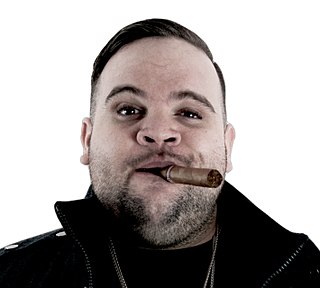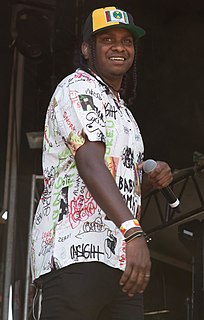Related Research Articles
Australian hip hop traces its origins to the early 1980s and is largely inspired by hip hop and other predominantly African-American musical genres from the United States. As the form matured, Australian hip hop has become a commercially viable style of music that is no longer restricted to the creative underground, with artists such as 1200 Techniques, Manu Crooks, Briggs, Baker Boy, Koolism, Hilltop Hoods and Bliss n Eso achieving notable fame. Australian hip-hop is still primarily released through independent record labels, which are often owned and operated by the artists themselves. Despite its genesis as an offshoot of American hip hop, Australian hip hop has developed a distinct personality that reflects its evolution as an Australian musical style.

Indigenous music of Australia includes the music of Aboriginal and Torres Strait Islander peoples of Australia, intersecting with their cultural and ceremonial observances, through the millennia of their individual and collective histories to the present day. The traditional forms include many aspects of performance and musical instrumentation which are unique to particular regions or Aboriginal Australian groups; there are equally elements of musical tradition which are common or widespread through much of the Australian continent, and even beyond. The culture of the Torres Strait Islanders is related to that of adjacent parts of New Guinea and so their music is also related. Music is a vital part of Indigenous Australians' cultural maintenance.
Native American Hip Hop is hip-hop culture practiced by people of Native American heritage; this also includes Canadian First Nation hip hop artists. As such, it is not a specific form of hip-hop but varies in style along the lines of hip-hop in general. Native Americans have been present in hip-hop culture since its inception as breakdancers, DJs, rappers, and graffiti artists. The Native American contribution to hip-hop can occasionally be veiled by the ethnic umbrella term of Hispanic or Latino, terms that do not specifically refer to race. The U.S. Office of Management and Budget currently defines "Hispanic or Latino" as "a person of Mexican, Puerto Rican, Cuban, South or Central American, or other Spanish culture or origin, regardless of race". Hip-hop is most often described as originating in the 1970s in the inner city African American and Latino American communities of New York City.
The National Indigenous Music Awards (NIMA), also known as the NT Indigenous Music Awards from 2004 to 2008, are awarded during the Darwin Festival and run by MusicNT in association with the Northern Territory Government. The National Indigenous Music Awards recognise excellence, innovation and leadership among Aboriginal and Torres Strait Islander musicans from throughout Australia. The Awards are presented at a special event in August as part of Darwin Festival, and feature the best of Indigenous music talent. To be eligible, the associated release or achievement must have taken place from July to June . The categories have changed over the years, but the main categories in the ceremony include Artist/Act of the Year, Album of the Year, Song of the Year, Film clip of the Year and Best New Talent/Emerging Talent, as well as an inductee into the Hall of Fame.
Scott Griffiths, better known by the stage name Optamus, is one of the MCs of the Perth-based Australian hip-hop group Downsyde and member of WA's Syllabolix Crew. Optamus is also the name of Griffiths' solo project.
Warren Hedley Williams is an Aboriginal singer, musician and songwriter from Hermannsburg in Central Australia. Williams is an Arrernte man who plays country music and works as a broadcaster on CAAMA Radio in Alice Springs He started playing guitar at six with his father Gus Williams.

Daniel Leo Sultan is an Australian alternative rock singer-songwriter and guitarist, actor and author. At the ARIA Music Awards of 2010 he won Best Male Artist and Best Blues & Roots Album for his second album, Get Out While You Can. At the 2014 ceremony he won Best Rock Album for Blackbird, which had reached number four on the ARIA Albums Chart. In 2017, Sultan's record Killer was nominated for three ARIA awards: Best Male Artist, Best Rock Album, and Best Independent Release. Sultan's debut children's music album Nali & Friends was named Best Children's Album at the ARIA Music Awards of 2019.
The 2010 Deadly Awards were hosted by Luke Carroll and Naomi Wenitong at the Sydney Opera House on 27 September 2010. Performers included Archie Roach, Dan Sultan, Christine Anu, Frank Yamma, Ali Mills and the Bangarra Dance Theatre. The Awards program will be broadcast on SBS and SBS Two on 3 and 6 October respectively. The awards event was an annual celebration of Australian Aboriginal and Torres Strait Islander achievement in music, sport, entertainment and community.

A Tribe Called Red is a Canadian electronic music group, who blend instrumental hip hop, reggae, moombahton and dubstep-influenced dance music with elements of First Nations music, particularly vocal chanting and drumming. Based in Ottawa, Ontario, the group consists of Tim "2oolman" Hill, and Ehren "Bear Witness" Thomas. Former members include co-founder DJ Jon Deck and Dan "DJ Shub" General, who left the band for personal reasons in spring 2014, and was replaced by Hill. Co-founder Ian "DJ NDN" Campeau left the band for health reasons in October 2017, with the band opting to remain a duo for the time being.

Adam Briggs, who performs as Briggs and self-describes as Senator Briggs, is an Indigenous Australian rapper, record label owner, comedy writer, actor, and author. Briggs became well known as a solo rapper, signing with Golden Era Records in 2009, before co-founding the hip hop duo A.B. Original in 2016.
A.B. Original is an Australian hip hop duo made up of Briggs and Trials. A.B. Original stands for Always Black, Original. Both members are Indigenous Australians; Briggs is a Yorta Yorta man and Trials is Ngarrindjeri. Their music is overtly political and has been described as "angry, polemical, brutally frank and meant to inspire a response, good or bad".

"January 26" is a song by Australian hip hop duo A.B. Original featuring singer Dan Sultan and was released digitally on 19 August 2016, as the fifth and final single from A.B. Original's debut studio album Reclam Australia. January 26 is the date of Australia Day, held on the anniversary of the date that the First Fleet arrived in Australia.

Danzal Baker, known professionally as Baker Boy, is an Aboriginal Australian rapper, dancer, artist, and actor. A Yolngu man, Baker Boy is known for performing original hip-hop songs incorporating both English and Yolŋu Matha.

Mau Power is a hip hop artist from Thursday Island in the Torres Strait and is the first Australian rapper to tour from this region. He is also the founder and executive director of One Blood Hidden Image, the first Torres Strait independent record distribution label, film production and media company.
The National Indigenous Music Awards 2019 are the 16th annual National Indigenous Music Awards.
The National Indigenous Music Awards 2018 are the 15th annual National Indigenous Music Awards.
The National Indigenous Music Awards 2017 are the 14th annual National Indigenous Music Awards.
The National Indigenous Music Awards 2010 are the 7th annual National Indigenous Music Awards. It was broadcast on ABC Local Radio NT.
The National Indigenous Music Awards 2013 are the 10th annual National Indigenous Music Awards.
References
- 1 2 "National Indigenous Music Awards Announce 2014 Finalists". 24 July 2014. Retrieved 10 August 2020.
- ↑ "2014 NIMA Winners". National Indigenous Music Awards. 2014. Retrieved 10 August 2020.
- ↑ "CELEBRATING INDIGENOUS CULTURE". nfsa. August 2014.
- ↑ "Jessica Mauboy, Dan Sultan and hip hop artist Briggs the big winners at National Indigenous Music Awards". ABC. 18 August 2014. Retrieved 10 August 2020.
- ↑ Renee Williamson and Frank Trotman-Golden (23 April 2009). "Making Waves Hip Hop launch". ABC. Retrieved 10 August 2020.
- ↑ "triplejunearthed Philly". triplejunearthed. Retrieved 10 August 2020.